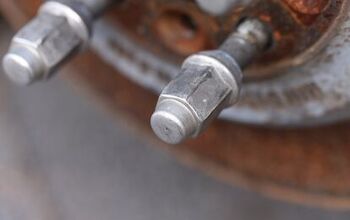Tales From the Service Desk: Dropping the Hammer

During my brief time as a service advisor/writer, I worked in two types of shops. One was an “express lube” – meaning this shop only did basic maintenance, such as oil changes and tire rotations. Cars that needed more complex repairs were sent across the parking lot to the main service bays – the full-service ones.
The other type of shop I worked at was a full-service one. This dealership had no express lube – techs did everything from oil changes to fluid flushes to warranty work to major customer-pay jobs.
I mention this because when I was working in the express lube, we didn’t have much to upsell. We got spiffs for tire rotations and filter replacements, but aside from those spiffs, we were on salary. So we had no incentive to “drop the hammer” – meaning to advise that a customer would need to spend hundreds, perhaps even a grand, on maintenance (think fluid flushes) and/or needed repairs (maybe the brakes were worn or a CV boot torn).
Later, of course, that changed – the full-service shop I worked in gave me the chance to upsell (I wasn’t good at that, which is why I am no longer in that world, but that’s a story for another time). But I never did feel right about dropping the hammer.
We can, and will, discuss whether fluid flushes and other expensive maintenance operations are needed in another post in this series. And sometimes, yeah, a car was so poorly maintained – or someone just had such bad luck – that a whole bunch of expensive repairs were needed. Often for safety’s sake.
But it was never, ever easy for me to try to sell someone who came in for a $30 oil change on the idea that their car would need, if not that day then sometime in the near future, several hundred dollars worth of work.
At this point, you might be thinking that someone who works in a sales-based profession shouldn’t feel guilty about selling service, especially if it’s needed to keep a car running safely. As long as the service is needed and the transaction is ethical, of course.
But the discussion about dropping the hammer goes beyond what guilt or hesitation any one individual might feel. It’s a question of best practices – is it better to be aggressive, knowing that even if the customer declines the work that day he or she might come back and do it at a later date? Or does giving a customer a laundry list of recommendations scare them away from returning?
I had a boss who said he never understood why people would “drop the hammer.” He implied that customers, especially those who didn’t know much about cars, would feel like the shop was trying to con them – even if their car legitimately did need a lot of expensive repairs – and/or that they’d feel intimidated to see all those recommendations on their repair order, especially if they only came in for a tire rotation.
Further, his stance implied that even if the customer bit and approved some or all of the work, they might regret it later, before deciding to seek out another shop for future work. Perhaps an independent, since they tend to be cheaper than dealerships.
I tend to think he was right, though I can’t deny that dropping the hammer successfully meant good things for the service writer. For the better ones, it meant another payment on their boat. For a struggling greenhorn like me, it could be the difference between the free buffet that came with the purchase of a $7 pitcher of swill at my neighborhood tavern, or a trip to a place that actually had tablecloths.
I was paid on commission based on a draw – which will also be covered later – and the difference between a $35 sale and a $900 sale could be huge.
Still, if I ever find myself wearing khakis and a dealer-logo polo ever again, standing behind a desk with an ancient computer, under fluorescent lights, I think I will aim for long-term customer retention over short-term gain. I’d think it might pay off – become a trusted service writer that customers ask for, and you’ll start selling certain major repairs, like a timing-belt replacement, with no effort at all. Because the customer trusts you.
When customers see that their car is due for major maintenance or repair, will they take it to the guy who will try to dump a bunch of upsells on them or the guy that they remember from last time who was gentle when it came to upsells?
I think you know the answer.
This isn’t to say a service writer can’t make recommendations and still be trusted. The good ones know how to do exactly that. They know what to recommend and what not to, how to explain it to the customer, how to tell the customer what he/she really needs and what isn’t urgent or a matter of safety. They also know how to set it up in the computer system so that the next time the customer comes in, they can be reminded of what’s needed.
It would be easy to say one reason I didn’t last as a service advisor is that I never figured out how to do it well, but while there’s some truth to that, I suspect writers who out-earned me struggle with it, as well. Some are just really aggressive, but they convince enough people to say “yes” that it counterbalances any potential loss of business from others.
These guys – and they were almost all guys – probably wouldn’t even notice that they could’ve made more money by better balancing the dance of when and when not to drop the hammer. Because they make enough to finance their lifestyle comfortably.
That is all for today’s peek behind the dealership curtain. Aspiring service writers (and managers) take note.
[Image: Phoutthavong SOUVANNACHAK/Shutterstock.com]

Tim Healey grew up around the auto-parts business and has always had a love for cars — his parents joke his first word was “‘Vette”. Despite this, he wanted to pursue a career in sports writing but he ended up falling semi-accidentally into the automotive-journalism industry, first at Consumer Guide Automotive and later at Web2Carz.com. He also worked as an industry analyst at Mintel Group and freelanced for About.com, CarFax, Vehix.com, High Gear Media, Torque News, FutureCar.com, Cars.com, among others, and of course Vertical Scope sites such as AutoGuide.com, Off-Road.com, and HybridCars.com. He’s an urbanite and as such, doesn’t need a daily driver, but if he had one, it would be compact, sporty, and have a manual transmission.
More by Tim Healey
Latest Car Reviews
Read moreLatest Product Reviews
Read moreRecent Comments
- Lou_BC Sweet car.
- FreedMike With 157K miles, that's basically a beater that looks good. Plus, I heard Honda CVTs turn dicey with age. I'm a "no" at $12,500, but someone's heart will go all aflutter over the J-vin (Ohio-vin?) and pay up. With a manual in the same shape, I'd be in for a LOT less.
- EBFlex More proof the EV world is crumbling. In a market with supposedly “insatiable demand”, these kinds of things don’t happen. Nor do layoffs.
- Buickman 17 Lacrosse, 18 Enclave, 19 Stingray Drop.each Red, Tan guts.I just want to feel this moment, and I own it~ (them, sic)
- FreedMike Dodge always had the best colors on the Challenger. I particularly liked Hemi Orange and Plum Crazy. Otherwise, give me Mazda's Soul Red.


































Comments
Join the conversation
I bought a Honda Civic and a Ford Escort within days and when I went to the dealers to have them serviced. the Honda dealer did service and that was all. The Ford dealer always had something to fix at my cost. I told the Ford guy why does my Escort always needed extra work when my Civic never did? He was stumped and I said the escort is not up to Civics standard of quality. He said the Escort was a better car. I laughed in his face. Never went to the Ford dealer and had the Escort serviced by the Honda dealer.
90% of these comments could be paraphrased by saying, “I expect the lowest possible price while expecting the highest possible level of service.” In other words, many of you have no clue how much it costs to operate a service department, let alone make it profitable. And yet I’m sure many, if not all, of you go into jobs that in someway, shape, or form are supported by profits gained from customers. A service department cannot make any profit from a $29.99 oil change coupon by the time they pay the technician .5hr at $30hr, buy 5qts of full synthetic oil and install a high quality OEM filter. Oh, and some dealerships will even wash the car for that $29.99. Oh and they had to pay a marketing company to send out that coupon. Take it from a service advisor who sold $250k monthly in parts and labor; it can be done ethically, and it can be done profitably, but it can’t be done easily. Everyone is okay with other businesses making a profit except car dealerships and their service departments. I will say that I wholeheartedly agree that dealerships do it to themselves by even attempting to market their services for so cheap, but since I don’t have an MBA I obviously have no idea what I’m talking about. /s